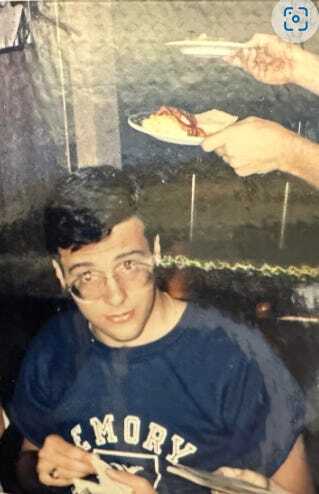A Memory of Sundays

There was a time in my life, in my early twenties, when the search for the perfect biscuit occupied a great deal of my attention.
The perfect biscuit was elusive prey in my hunt through Atlanta neighborhoods for a great Sunday brunch with my college and post-college friends. A great biscuit was a sign that everything else was going to be ok in a restaurant. But it was also a sign of doom, because it seemed like whenever we found a good biscuit, the clock started ticking. Quality began to slip. The biscuit was always the canary in the coal mine. When it started sliding from great to good to mediocre, we knew it was time to get out and find a new place.
These were not fancy brunch places. This was before fancy brunch. Or maybe we were just poor students and recent graduates who couldn’t afford fancy anything. All we were looking for was good food and a place where we could hang out for a long time without being chased out.
For most of this era, whether or not the biscuits were good, our Sundays started at The Dugout, a large and nondescript bar just across the street from the Emory campus, housed in one of the two blocks of shops that made up what was ambitiously called, “Emory Village.” When I first arrived on campus, a local Greek place offered a “Spartan Breakfast” that included three pancakes, three eggs, sausages, potatoes, and toast. As restaurants in the neighborhood came and went, the Big Breakfast remained. By the time I was a senior, it was The Dugout’s turn to provide it.
It was ideal, and not just because it was across the street from school. By the time we started meeting for brunch, none of us even lived on campus anymore. But, because they were known mostly as a bar, not a ton of people showed up there for breakfast, so they didn’t seem to mind if we stayed there for hours. My friend, Kristin, who worked there as a brunch waitress, she minded. Breakfast tips were bad enough to begin with, but at least you could turn the tables quickly. Usually.
I don’t remember if there was ever a set, agreed-upon meeting time. People just tended to show up whenever they showed up, and the table elongated as more and more people arrived. Sections of the Sunday New York Times and the Atlanta Journal Constitution got pulled apart and passed around, and coffee eventually turned to iced tea once people finished their food. No one was in a rush to leave. We ate and drank and read and talked. I have no idea what we talked about, but there was never much of a lull. Nothing outside was calling for our attention—that day or any other day.
Sometimes, when we finally peeled ourselves away from the table, we’d go bowling, or see a movie. Sometimes we went our separate ways for a while and came back together later, for a big pot of spaghetti at somebody’s house. Sometimes we didn’t see each other until nighttime.
What did I do with my Sundays when I was alone? I barely remember. When the weather was nice, I probably went for a run in the afternoon. Maybe I watched old movies if something good was on the pre-cable TV. Those afternoons are lost to me. What I remember are the days I spent with my friends.
There was one Sunday when we moved with great purpose from The Dugout to a Zesto location near campus. Zesto was a frowsy but loveable burger and chili-dog place. Their food was terrible, but it was predictable, and it was there. Sometimes, when you’re young, the foot-long chili dog in front of you is worth two quality hamburgers that you have to drive to.
Why did we go to Zesto right after eating, that day? Well, the Zesto drink cups had a distinctive design, and the cups were always displayed over the cash register, moving from small to medium to large, with a fried chicken bucket sitting next in line, with the same design as the drink cups. We had stared at this lineup for years. My friend, Haynes, had sworn that someday he was going to order a chocolate shake in that chicken bucket. Today was going to be that day.

The high-school kid at the counter was mightily annoyed, but he played along. It was probably a wise move. We were way too excited about our mission, and we were not to be deterred. The chicken bucket didn’t fit in the machine, of course, so the kid had to make shake after shake and then dump the contents into the bucket, over and over, until it was full. We cheered him on through the whole process. I don’t remember how many cups it took or how much it cost, and I don’t remember if, even with four or five of us digging into it, we were able to finish it. But we felt like we had accomplished something meaningful.
Our life goals were very manageable, back then.
Whatever we did with our days, separately or together, we all came back to The Dugout at night, closing the Sunday loop, because that was when the Indigo Girls played.
I met Amy Ray and Emily Saliers during my senior year, when they were selling this little 45 RPM record outside the student center:

We became friends. We took some classes together. They wrote some songs for theater productions I did. Amy played in the show band when I directed “Godspell.” But more importantly, we all became fans and camp followers, going wherever they were playing and taking that fierce, proprietary, protective interest you take in a band or an art form when you think you’ve discovered something that the rest of the world hasn’t found out about yet.
Sundays at The Dugout was one of their first regular gigs. This was so early in their history that I remember them introducing themselves by saying, “We call ourselves Indigo Girls.” We would scribble requests on cocktail napkins and hand up to them—sometimes suggesting entire set lists for them. They were as patient with us as that Zesto kid had been. They even humored us when we insisted on singing backup into empty beer bottles during their cover of “Love the One You’re With.”
We were there every Sunday, and we were there through all three of their sets. We drank cheap pitchers of beer, which our miracle waiter, Beau, seemed to refill at just the right time, without ever having to ask us. We were there until closing time. We were there past closing time, sometimes. In fact, two of us were there so far beyond closing, one night, that the owner allowed us to slump down in our chairs and sleep for a couple of hours until the place opened up again for breakfast.
What did Monday require of us? Not much.

The Indigo Girls moved on to play at more and better venues around Atlanta and then, of course, around the world. The Dugout eventually closed. I’m not sure what took its place. It’s probably been ten different things since those days.
And why not? We’ve all been different things since then, trying on possible lives until we found ones that fit. Some of us had to spend more time in the changing room than others, but we all got there, sooner or later.
Most of Atlanta is unrecognizable to me now. I go there on work trips, and it’s harder and harder to find a patch of ground that looks familiar. New roads, new buildings, new landscaping, and always new stores and clubs and restaurants. I couldn’t even find my way around the Emory campus, the last time I was there.
I’ve had plenty of happy Sundays since those days—some with friends, some with family. But there was something special about that time of my life—after college, before career, in a strange and listless holding pattern where time seemed to be an endlessly available commodity, and a Sunday could unfold and expand like the sections of a newspaper, spreading out to make sure everyone could grab a piece.
Drink that shake. Sing that song. Old Time is still a-flying.
Scenes from a Broken Hand
- Andrew Ordover's profile
- 44 followers



